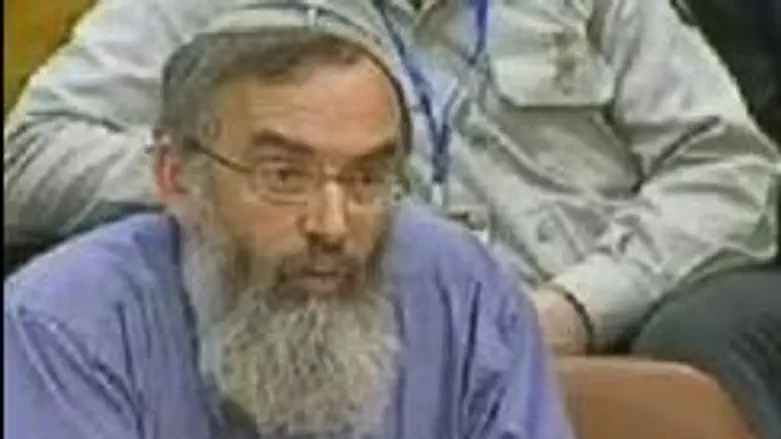
Two Knesset committees – Foreign Affairs/Defense and Education – held a joint session on Monday to discuss the increasingly common phenomenon of refusal of military orders.
In the past, refusal in Israel was traditionally identified with the left-wing. In early 2002, for instance, the "Courage to Refuse" movement released a letter signed by 570 reserve soldiers and officers who refused to serve in Judea and Samaria. Over a year later, a group of Israel Air Force pilots announced their refusal to carry out air strikes there. In December '03, 13 reserve soldiers and officers who had served in the the elite Sayeret Matkal unit signed a letter declaring their refusal to serve in those territories.
Rabbi Stav: “I am against political refusal. But of late we have been dealing with a collision between religious principles and democratic issues."
Of late, however, refusal has come from the nationalist-religious end of the spectrum, because of the proliferation of “evict and demolish” orders issued against Jewish residents of Judea and Samaria. In 2005, thousands of Israelis signed a petition saying they would refuse to uproot Israeli towns in the Disengagement/expulsion. Many individual soldiers, in fact, refused such orders, and were punished with jail time and demotions.
The phenomenon has gained steam with the continued issuance of demolish-and-expel orders against Jewish outposts and their residents - and reached the top of the headlines several weeks ago with the ejection of Yeshivat Har Bracha from the Hesder program because, inter alia, of remarks by its Dean, Rabbi Eliezer Melamed, promoting the refusal of such orders.
Chairman Orlev: Refusal is a Fact of Life
MK Zevulun Orlev, who heads the Knesset Education Committee, chaired the joint session, and introduced it by saying, “Refusal in the IDF is a fact of life that is found in all population sectors. Such a session as the one we are holding now could not have occurred 20 years ago, but unfortunately the polarization in our society and the disputes in the State of Israel have led us to hold this session today – itself teaching us that we have a problem; there is no point in hiding it or covering it up.”
Heshin and Ketzaleh Spar
Retired Supreme Court Justice Mishael Heshin said, “Refusal of a demolition order destroys the army... If the ‘black flag of illegality’ waves over an order, then it must not be fulfilled. But the State did not wave such a flag over participation in the outer rings of a [demolition-and-expulsion] operation… Personal refusal is one thing, but refusal of an entire sector is a contagious disease. It leads to the minority taking control over the larger group.”
At this point, MK Katz interrupted: “You mean like in the Supreme Court.”
Silence ensued for several moments, until Heshin – a former Deputy Chief Justice on the Supreme Court – took off his glasses and said to Katz, “Abraham received the angels more warmly than you are receiving me here in the Knesset.”
Minister Saar
Education Minister Gideon Saar said, “Refusal endangers ourability to run a democratic regime, with the political echelons setting policy and the military fulfilling the orders without hesitation.”
Rabbi Stav: Religious Refusal is Different
Rabbi David Stav, head of the Hesder Yeshiva in Petach Tikvah, said the issue today is not political refusal, but rather refusal to fulfill orders that negate one’s religious principles: “I am against political refusal. But of late we have been dealing with a collision between religious principles and democratic issues. Questions of values and of politics don’t always go hand-in-hand, and there are some issues of values that we do not ask the soldier to give up on – just as we don’t ask him to give up on Sabbath observance when he’s in the army.”
“I would expect a soldier to refuse orders to hit a Jew or an Arab for no reason, or to expel a person from his home if he has no place to go to.”
“There is a dispute among rabbis as to whether such orders directly contravene Jewish Law or not,” Rabbi Stav said. “But a way has to be found to ensure that soldiers are not forced to feel that they are violating their religious beliefs.”
In June 2004, MK Aryeh Eldad and then-MK Effie Eitam (National Union) initiated a bill banning the use of soldiers in the removal of Jewish settlement spots. Nothing came of this initiative, or of subsequent others like it.
Chief IDF Education Officer Brig.-Gen. Eli Shermeister attempted to pour cold water on the debate, telling the MKs that the problem was not as widespread as feared: “Despite the many different opinions among the soldiers, the phenomenon of refusal in the IDF is marginal… We expect that the soldiers leave the political disputes outside the military arena.”
Extremist left-wing reporter Gideon Levy, of Haaretz, said he admires those who refuse orders for reasons of conscience and are willing to pay the price – even those in the nationalist camp. “I don’t think that refusal is a danger to the army,” Levy said. “The IDF is strong enough to deal with it.”
